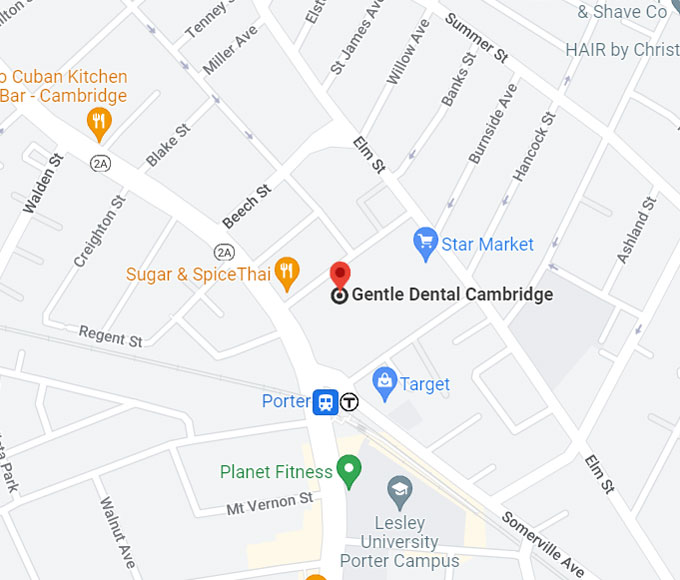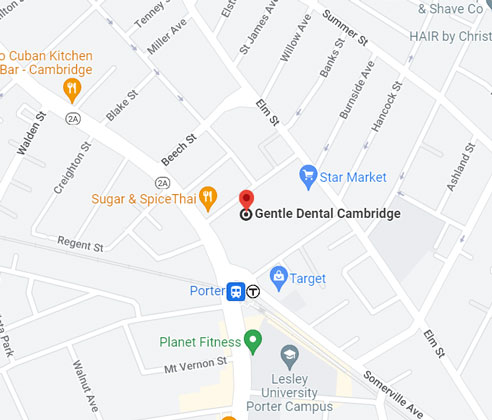- Locations
- Locations
- Arlington
- Attleboro
- Belmont
- Beverly
- Boston
- Braintree
- Brockton
- Brookline
- Burlington
- Cambridge
- Chelmsford
- Concord, NH
- Derry, NH
- East Longmeadow
- Exeter, NH
- Franklin
- Hanover
- Hudson
- Keene, NH
- Malden
- Manchester, NH
- Medford
- Methuen
- Milford
- Nashua, NH
- Natick
- New Bedford
- North Andover
- Norwood
- Peabody
- Quincy
- Raynham
- Rochester, NH
- Saugus
- Seekonk
- Somerville
- Stoughton
- Wakefield
- Waltham
- Worcester
- Dental Services

Endodontics - Cambridge
Restore your tooth health in just a few visits with expert Cambridge endodontists, addressing deep infections and preserving natural teeth for a healthier, more confident smile.
Dental Office Hours
Monday 7:00 AM - 8:00 PM
Tuesday 7:00 AM - 8:00 PM
Wednesday 7:00 AM - 8:00 PM
Thursday 7:00 AM - 8:00 PM
Friday 7:00 AM - 5:00 PM
Saturday 9:00 AM - 5:00 PM
Sunday CLOSED
More Information
Located in the Porter Square Shopping Center. Free parking.
Now Welcoming Fresh Pond Dental patients!
Dental Office Hours
Monday 7:00 AM - 8:00 PM
Tuesday 7:00 AM - 8:00 PM
Wednesday 7:00 AM - 8:00 PM
Thursday 7:00 AM - 8:00 PM
Friday 7:00 AM - 5:00 PM
Saturday 9:00 AM - 5:00 PM
Sunday CLOSED
More Information
Located in the Porter Square Shopping Center. Free parking.
Now Welcoming Fresh Pond Dental patients!
Gentle Dental Cambridge Reviews
Today my temporary crown was replaced with the permane Mr. Went , exellent work, molar fits perfectly.
Came in for an emergency appointment. Dr Andrew was very helpful. He gave me his business card and told me to call/email him should my condition worsen, and that he will be there if I needed to see the ER. Place is very clean and modern. Reception staff are also very helpful and friendly. I have no gauge of the prices in the Cambridge area but I didn't have insurance and what I was charged was quite reasonable for what I needed to be treated for.
Dental Services in Cambridge
Our experienced endodontist in Cambridge, MA, offers expert care for treating tooth infections and preserving natural teeth through advanced endodontic procedures, ensuring long-term dental health.
Preventive Care
Restorative Care
Crowns and Bridges
Dental Fillings
Extractions
Gum Treatments
Implants
Oral Surgery
Partial and Full Dentures
Root Canals
Wisdom Teeth Extractions
Orthodontics
Additional Services
Why Choose Endodontics?
Endodontics is a dental specialty focused on treating the soft tissues inside the teeth, which can become infected due to decay or injury. If you're experiencing severe tooth pain or sensitivity or notice an abscess on the gums (often resembling a pimple), contact us immediately for expert guidance and treatment.
What Services Does An Endodontist Provide?
Endodontists, like our specialists in Cambridge, MA, often perform root canals, retreatments, and other therapeutic procedures for tooth pulp issues. While general dentists can perform root canals, complex cases may require the expertise of an endodontist. With advanced training, our endodontist in Cambridge, MA, can provide treatments that fully restore the function and health of your natural teeth.
When Should You Visit A Cambridge Endodontist?
Our endodontists focus on preserving your natural teeth. Seeing an endodontist is essential if you're experiencing tooth pain or tenderness or suspect an infection. You can contact us directly or ask your general dentist or healthcare provider for a referral to consult with our specialists.
What Does An Endodontic Procedure Include?
Root canal therapy typically requires one to three visits to complete. Before starting the procedure, an endodontist will take detailed X-rays to examine the tooth thoroughly.
The endodontist begins by administering a local anesthetic and placing a dental dam (protective sheet) to keep the treatment area saliva-free. They then open the tooth's surface and remove the infected pulp using small instruments.
Next, the endodontist shapes, clean, and fills the root canal with gutta-percha, a rubber-like biocompatible material. Cement is applied to seal the canals fully. A temporary filling usually restores the tooth's function until the final restoration is ready. During the final visit, a permanent restoration or crown completes the treatment.
What Are The Common Reasons For Endodontic Treatment?
Here are some of the primary causes of inner tooth damage:
- Bacterial Infections: Oral bacteria are the leading cause of endodontic issues. Bacteria can enter the tooth pulp through tiny cracks caused by decay or injury, leading to inflammation and infection. If left untreated, this can jeopardize the tooth and result in an abscess.
- Fractures and Chips: When a significant portion of the tooth's surface or crown detaches, it can expose the pulp, causing severe pain and complications. Root canal therapy may be necessary to treat and restore the tooth.
- Injuries: Direct or indirect trauma to the mouth can cause a tooth to become dislodged or luxated. After stabilizing the tooth, root canal therapy is often needed to preserve the tooth and prevent further damage.
- Tooth Displacement: If a tooth is knocked completely out of its socket, it's crucial to rinse it and put it back in as quickly as possible. If this isn't possible, place the tooth in milk or a particular dental solution (available at pharmacies) to keep it moist until you receive emergency dental care. The dentist secures the tooth with a splint and then performs root canal therapy to save it.
Each of these issues requires timely treatment to ensure the health and function of the affected tooth.
What Are The Common Procedures Used In Endodontics?
Our Cambridge Endodontists offer a range of specialized procedures, including:
- Root Canal Treatment is one of the most common endodontic procedures. It treats the dental pulp in cases of moderate-to-severe tooth decay. The dentist opens the infected tooth at the crown to access the root canal, thoroughly removing the infection. After cleaning, the dentist enlarges the canal and fills it with a temporary filling. Once the tooth heals, the dentist replaces the temporary filling with a permanent one and seals the tooth to prevent further infection. The dentist may place a crown to protect the tooth.
- Endodontic Retreatment: In cases where a tooth has not healed correctly, or new issues have arisen, retreatment involves removing the crown and previous filling to clean and refill the tooth, promoting proper healing.
- Treatment of Cracked or Injured Teeth: The dentist provides specialized care to address the damage and restore teeth with injuries or cracks affecting the dental pulp.
The dentist designs each procedure to save natural teeth and maintain dental health.
When Should I Consider Getting A Root Canal?
Persistent tooth pain may indicate advanced tooth decay, a bacterial abscess, or a crack in the tooth's surface. If you're experiencing any of the following symptoms, it could be a sign that you need a root canal, and you should seek treatment with endodontists:
- Sensitivity to hot or cold temperatures
- Loose teeth
- Swelling in the jaw or gums
Prompt dental care can help address these issues and prevent further complications.
Root Canal Vs. Tooth Extraction: Which Is The Better Option?
People often mistake a root canal for tooth extraction, but they are two distinct procedures. Root canal therapy preserves the natural tooth by removing the diseased pulp. While the dentist may place a crown to restore the tooth, the surrounding teeth' root, bone structure, and alignment remain intact.
However, when injury, infection, or an abscess damages a tooth, the dentist may determine it is impossible to be saved and will perform the extraction. An endodontist in Cambridge, MA, or an oral surgeon carefully loosens and removes the tooth from its socket. The dentist then recommends a dental implant or bridge to restore function and appearance and prevent complications from the gap.
What Other Treatments Do Endodontists Provide?
A tooth infection caused by bacteria is one of the most common reasons patients seek the expertise of an endodontist. These specialists, like our endodontist in Cambridge, MA, are also highly skilled in treating tooth injuries from accidents, sports, or other mishaps. With prompt care, an emergency dentist can often stabilize an injured or dislodged tooth and restore it to its socket.
Endodontists perform several specialized procedures, including:
- Apicoectomy: An endodontist performs endodontic microsurgery to remove infected tissue from the root tip when it cannot be accessed through a traditional root canal.
- Pulpotomy: Similar to a root canal, this procedure treats and removes infected tissue from the pulp in the tooth crown, typically due to decay. Unlike an entire root canal, the pulp in the root remains intact, allowing the tooth to continue growing.
- Retreatment: Sometimes, the original symptoms return, necessitating a root canal retreatment. It may occur due to new trauma or infection in the small root canal passages.
Endodontists in Cambridge, MA, are dedicated to preserving your natural teeth and providing expert care for complex dental issues.
Frequently Asked Questions
What does an endodontist do?
Highly trained endodontists are specialized dental professionals who focus on treating the inner tissues of teeth. They diagnose and treat complex causes of tooth pain, such as infections and abscesses. Endodontists perform root canal treatments and other procedures to alleviate discomfort, primarily preserving your natural tooth.
How does an endodontist differ from a general dentist?
Endodontists and general dentists provide essential dental care, but their focus differs. A general dentist handles a variety of treatments, including teeth cleanings, cavity fillings, and placing sealants. In contrast, an endodontist is a specialist who focuses primarily on diagnosing and treating tooth pain, often through root canal procedures. While dentists cover many dental services, endodontists concentrate on saving teeth and addressing complex tooth pain.
Is a root canal the same as an endodontic?
The term "Endo" comes from the Greek word for "inside," and "odont" means "tooth." Endodontic treatment focuses on treating the inside of the tooth. A root canal is one specific type of endodontic procedure.
When is it necessary to see an endodontist?
Persistent dental pain is a clear sign that you should consult an endodontist. As specialists in diagnosing complex dental issues, endodontists can identify the source of pain when other treatments have failed. If your tooth pain persists and nothing provides relief, it's time to reach out to an endodontist.
Will I need a crown after a root canal?
The general rule is that the dentist must place a crown over a tooth that has just received a root canal if it is a premolar, molar, or one of the back grinding teeth. The dentist ensures these teeth stay strong since they are used continuously for eating throughout the day.
Is it better to retreat a root canal or extract the tooth?
If your tooth experiences persistent infection or new decay following a root canal, retreatment is worth considering. With a success rate of 70% to 88%, repeat root canal therapy is highly effective in saving teeth that might otherwise need extraction.
Book an Appointment
If your request is a dental emergency, or you would like to call and schedule your dental appointment, contact information for our offices can be found here: Gentle Dental Locations. New patient offer not valid for emergency appointments.

